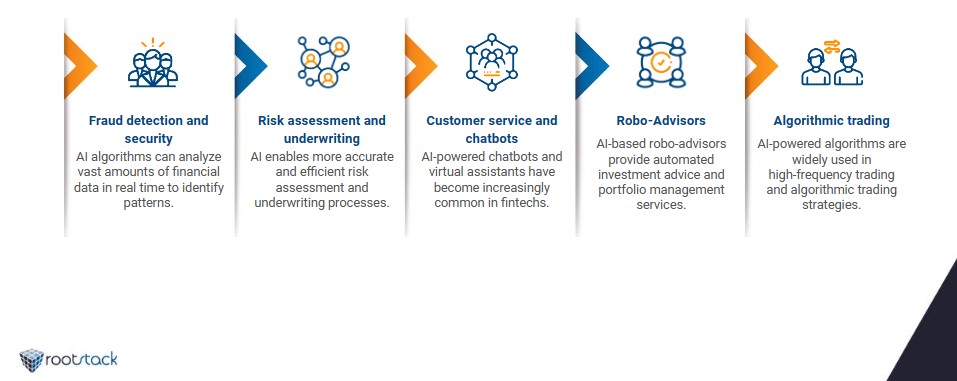The role of artificial intelligence in Fintech
June 14, 2023
Table of contents
Quick Access

Everything evolves, from animal kingdom members to immaterial things like industries, particularly the financial industry. Banking institutions and comparable businesses have been the most impacted by technology and have had to adjust to new trends. Fintech firms are among them.
Fintech, an abbreviation for financial technology, refers to the use of technology to improve and develop many elements of financial services. It refers to a wide range of applications and solutions that use developments in software, mobile devices, artificial intelligence, blockchain, and data analytics to alter traditional financial systems and processes.
Fintech companies are involved in financial services and sectors such as banking, payments, loans, investment management, insurance, and personal finance management. The major goal is to give consumers with an effective and simple financial solution that is also available from numerous devices or locations throughout the world. They also work for other businesses and financial organizations.
What constitutes a Fintech?
The following are some of the most common examples of this technological practice:
- Digital Payments: Fintech has transformed the way we pay, with solutions such as mobile wallets, peer-to-peer payment apps, and contactless payments becoming increasingly popular.
- Online Lending and Crowdfunding: Through online lending and crowdfunding platforms, fintech platforms have made it easier for consumers and small enterprises to acquire loans and financing possibilities.
- Blockchain and cryptocurrencies: Fintech has also given rise to cryptocurrencies like Bitcoin and the underlying blockchain technology, which enable safe, decentralized transactions without the use of intermediaries.
- Fintech advances have moved to the insurance industry, with the creation of digital platforms that provide expedited insurance processes, automated underwriting, and customized coverage.
Overall, fintech is reshaping the financial landscape by introducing new business models, improving customer experiences, improving efficiencies, and increasing financial inclusion for individuals and businesses around the world.
Fintech and artificial intelligence
Artificial intelligence is the current technical trend. Although it is nothing new, it has been used more than ever in recent months, particularly by a segment of the public that does not have a thorough understanding of technology.
Fintech firms can benefit greatly from this simulation of the human mind, as artificial intelligence has been characterized by specialists in the field, and use it for a variety of purposes, including:
Security and detection of fraud
AI systems can scan massive volumes of financial data in real time to spot trends and abnormalities that indicate fraudulent conduct. AI systems can increase their ability to detect and prevent fraud by continuously learning from new data, enhancing security for both financial institutions and clients.
Risk evaluation and underwriting
AI makes risk assessment and underwriting processes more precise and efficient. Machine learning algorithms can assess creditworthiness, automate loan approvals, and predict default risks by analyzing large data sets. This enables financial organizations to make more informed decisions, streamline operations, and enhance customer experiences.
Customer service and chatbots
AI-powered chatbots and virtual assistants have become increasingly common in fintech. These systems use Natural Language Processing (NLP) to understand and respond to customer inquiries, provide personalized recommendations, and help with account management. AI-powered chatbots can offer 24/7 support, reduce wait times and improve overall customer satisfaction.
Robo-Advisors
AI-powered robo-advisors offer automated investing advice and portfolio management. Robotic advisers can offer individualized investment plans at a fraction of the cost of traditional human advisors by evaluating financial data, market movements, and customer preferences. They make investment options more available to a broader range of clients and assist them in making informed investment decisions.

Trading with algorithms
High-frequency trading and algorithmic trading tactics frequently employ AI-powered algorithms. These algorithms can rapidly scan massive volumes of market data, discover trends, and execute trades. AI allows for the automation of business choices, which improves accuracy, reduces costs, and maximizes returns.
Normative compliance
AI systems help financial institutions ensure regulatory compliance. They can analyze large volumes of legal and regulatory documents, helping institutions stay current on regulatory changes and identifying potential compliance issues. AI can also automate compliance checks and flag suspicious transactions, supporting anti-money laundering (AML) efforts.
Personalized financial recommendations
AI algorithms can analyze customer financial data, transaction history, and spending patterns to deliver personalized recommendations. By understanding individual preferences and financial goals, AI can suggest personalized financial products, budgeting strategies, and savings plans, improving customer engagement and loyalty.
We recommend you on video
Related Blogs


How to integrate UiPath RPA with a database

Magento Development Services for the Healthcare Industry
Best Practices for Hiring a Drupal Developer

5 steps of UiPath RPA implementation

